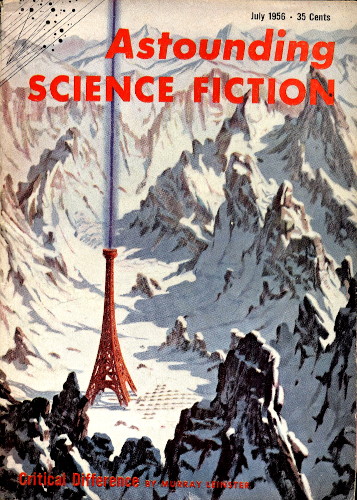
CRITICAL DIFFERENCE
BY MURRAY LEINSTER
[Transcriber's Note: This etext was produced from
Astounding Science Fiction, July 1956.
Extensive research did not uncover any evidence that
the U.S. copyright on this publication was renewed.]
I
Massy waked that morning when the only partly-opened port of hissleeping-cabin closed of itself and the room-warmer began to whir. Hefound himself burrowed deep under his covering, and when he got hishead out of it the already-bright room was bitterly cold and his breathmade a fog about him.
He thought uneasily, It's colder than yesterday! But a ColonialSurvey officer is not supposed to let himself seem disturbed, inpublic, and the only way to follow that rule is to follow it inprivate, too. So Massy composed his features, while gloom filled him.When one has just received senior service rating and is on one's veryfirst independent survey of a new colonial installation, the unexpectedcan be appalling. The unexpected was definitely here, on Lani III.
He'd been a Survey Candidate on Khali II and Taret and Arepo I,all of which were tropical, and a Junior Officer on Menes III andThotmes—one a semiarid planet and the other temperate-volcanic—andhe'd done an assistant job on Saril's solitary world, which wasnine-tenths water. But this first independent survey on his own wasanother matter. Everything was wholly unfamiliar. An ice planet with aminus point one habitability rating was upsetting in its peculiarities.He knew what the books said about glacial-world conditions, but thatwas all.
The denseness of the fog his breath made seemed to grow less as theroom-warmer whirred and whirred. When by the thinness of the mist heguessed the temperature to be not much under freezing, he climbed outof his bunk and went to the port to look out. His cabin, of course,was in one of the drone-hulls that had brought the colony's equipmentto Lani III. The other emptied hulls were precisely ranged in orderoutside. They were duly connected by tubular galleries, and verypainstakingly leveled. They gave an impression of impassioned tidinessamong the upheaved, ice-coated mountains all about.

He gazed down the long valley in which the colony lay. There weremonstrous slanting peaks on either side. They partly framed the morningsun. Their sides were ice. The flanks of every mountain in view wereice. The sky was pale. The sun had four sun-dogs placed geometricallyabout it. It shone coldly upon this far-out world. Normal post-midnighttemperatures in this valley ranged around ten below zero—and thiswas technically summer. But it was colder than ten below zero now. Atnoon there were normally tiny trickling rills of surface-thaw runningdown the sunlit sides of the mountains—but they froze again at nightand the frost replaced itself after sunset. And this was a shelteredvalley—warmer than most of the planet's surface. The sun had itssun-dogs every day, on rising. There were nights when the brighterplanets had star-pups, too.
The phone-plate lighted and dimmed and lighted and dimmed. Theydid themselves well on Lani III—but the parent world was in thissame solar system. That was rare. Massy stood before the plate andit cleared. Herndon's face peered unhappily out of it. He was evenyounger than Massy, and inclined to lean heavily on the supposedly vastexperienc